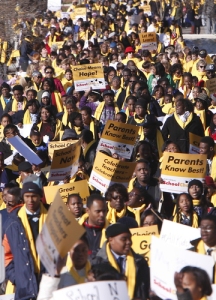Just read this great article by a parent who works in a public charter school. Charter schools are not immune to the problems of traditional public schools – But you also can’t
read this article and proclaim traditional charters are superior. Please focus on the content of the article, about parents making choices for their own kids.
These are two former blogs about this very topic – what parents decide for their own kids:
When the only option is a failing school & Sounds good in theory, but not in practice
This article is written by a parent working in the same school her own child attended.
My 8-year-old daughter’s class was chaotic after her first-year teacher got married in Chicago and then relocated to Texas after Christmas break. It was hard enough to bring on a new teacher in the middle of the year, but the situation was only exacerbated when the replacement teacher was also brand new to the profession. (In fairness, my daughter’s class of 28 students was difficult to manage even for more experienced teachers. Teachers had to tap into their inner guru each and every day.)
My administration was trying to work with the replacement teacher, but it was painful for me to watch professional development attempts being made for a novice teacher who was in full crisis mode. Assurances from my school leaders that, with more instructional coaching, the class would gradually get better in time, fell flat with me. It was now February—how much more time could my child afford?
The complacency that the administration goes through in keeping this teacher, or hiring her in the first place. I talked a little bit about how teacher education needs to be improved in this blog but I am tired of administrations doing what they can to help (even if it’s ineffective) and settling for that being the best they can do. We need all of our kids to have an excellent education and large part of that is a great teacher.
My kid wasn’t ambivalent; she knew what she wanted. In fact, she begged me to transfer her out of the school that she had once loved. Even at 8, she was willing to say goodbye to all her friends to gain a sense of emotional safety and sanity.
I love my school and count many of my colleagues as my friends. The teachers (including my daughter’s former teachers) work extremely hard, and it’s obvious that they care about the students. And since it’s a charter school, parents like me feel fortunate that our kids’ names were pulled from the lottery and granted admission. I’ve often lamented that all kids and parents don’t have access to good schools like this one, district or charter.
But now I found myself contemplating the unthinkable—transferring my little girl out.
Parents are dealing with these struggles every day. Charter or traditional public school we need to make sure that every child has an effective teacher. I keep saying that our kids aren’t going to get those days of lost education back. We need to care right now about getting the best kids in the classroom.
The mom continues…
Last week, a colleague passed on a powerful article about the author Doug Lemov, who wrote “Teach Like a Champion,” to my principal, who then passed it on to me. These bits from the article gave me peace about the decision I made:
The evidence suggests that a child at a bad school taught by a good teacher is better off than one with a bad teacher at a good school. The benefits of having been in the class of a good teacher cascade down the years; the same is true of the penalty for having had a bad teacher.
In 1992, an economist called Eric Hanushek reached a remarkable conclusion by analyzing decades of data on teacher effectiveness: a student in the class of a very ineffective teacher—one ranked in the bottom 5 percent—will learn, on average, half a year’s worth of material in one school year, whereas if she was in the class of a very effective teacher—in the top 5 percent—she would learn a year and a half’s worth of material. In other words, the difference between a good and a bad teacher is worth a whole year.
Here you go. Evidence that our kids are literally loosing out by not having a great teacher. Parents are left with very few options if they feel their child is not getting an adequate education. And sometimes they choose another school, yet they shouldn’t have to. While education theorists and unions and the media are criticizing themselves daily, our nation’s kids are sitting in classrooms with ineffective teachers. We need to spend more time “on the ground” with kids and teachers and less time in the ivory towers of “theory” and “rhetoric.”
The mom ends:
It means that if any one of my students’ parents were to have insight into the day-to-day happenings in the school or classroom the way I am privy to it as a staff member, would they trust that their child was getting the absolute best education possible?
In other words, it means that educators need to approach our practice with the same diligence we would have if our own biological child sat in every single class.
My household operates on a tight budget, so the $700 a month private school tuition bill I now have to pay really hurts. But now that my little girl is excited about learning again and is able to focus in class, I realize that the cost of the status quo was way more expensive.











